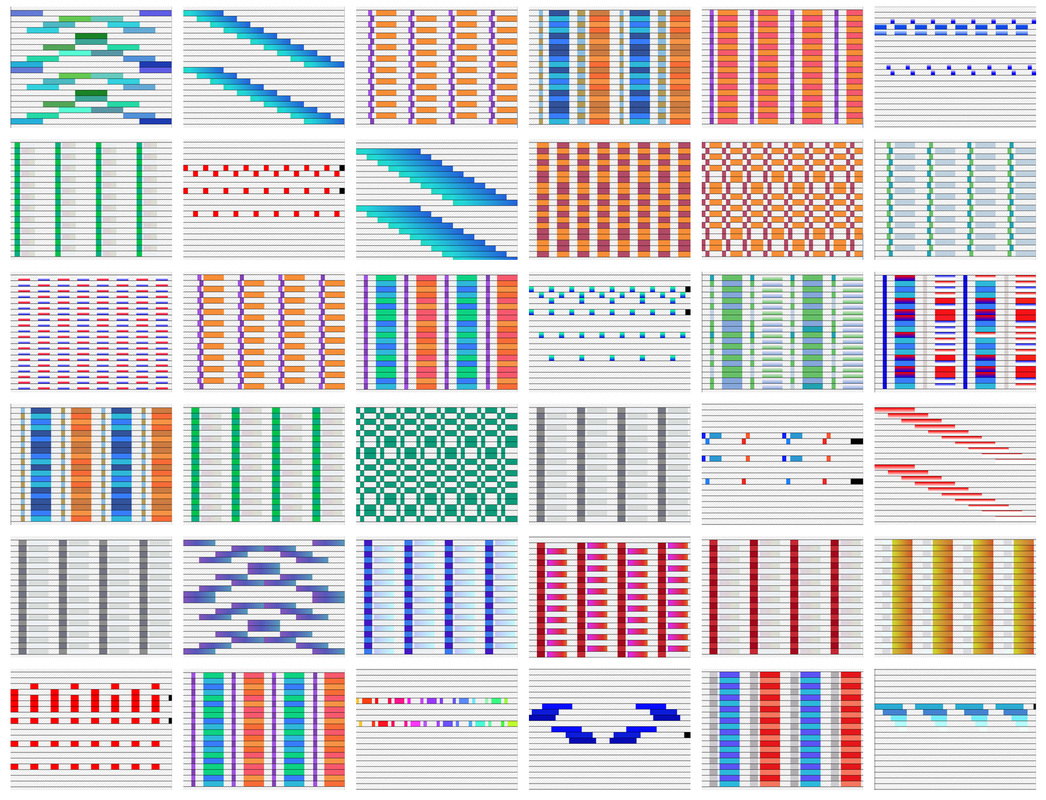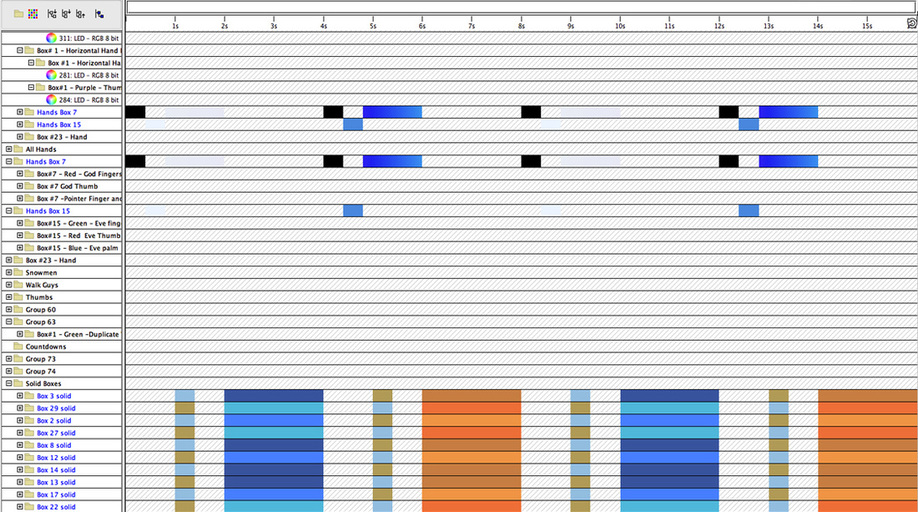Visual Design | Lighting and Projection Design Theatrical Projects + Scenic Design
|
Light Symphony Composer and LED Programmer Crossing Signal Mosaic Parc on Powell Apartments 1333 Powell Street, Emeryville, CA Viewable sunset until 2:00 am 2015 "Crossing Signal Mosaic,” Therese Lahaie's Public Art installation, is a ceiling mounted light sculpture composed of an array of DMX-controlled LED boxes that have been programmed to play a visual symphony of pedestrian crossing signal imagery and colored panels. The piece was designed as a conversation with the rhythms of the adjacent busy intersection. The sculpture contains 17 light boxes incorporating 123 channels programmed for continuous play from sunset until 2:00 AM, along with a short hourly daytime program. Dimensions: 28’L x 8’W x 5’D. |
|
In designing the light symphony, I relied on musical composition techniques, using rhythm and counterpoint along with variations in color and imagery as instrumentation, timbre and texture, creating over 100 short programs that could be combined together in numerous configurations to produce the complex light symphony.
Therese Lahaie designed the different characters in the sculpture in relation to the adjacent crossing signals icons at the intersection of Hollis and Powell Street. The light box imagery refers to the vibrant bursts of the yellow, red and green street lights, along with the flashing of crossing men, stop hands, and countdown walk timers. Our goal for the light symphony was to use these elements formally and metaphorically to create a beautiful, sensuous, and playful visual experience that would be in conversation with and counterpoint to the cacophonous intersection below. |
Programming Grid | 36 Timelines
To create the programming, I made over 100 separate short timelines that could be configured and overlaid sequentially in numerous ways. The textile-like patterns shown here in the composite details of 36 individual programming timelines resemble graphic scores delineating notational information for musicians. Similar to musical notes, the individual colored blocks, along with their encoded timing and intensity information, specify the precise interaction of light within the sculptural boxes, each horizontal line representing a single lighting channel or channel group. Configured together, the timeline programming runs the DMX controller which triggers the intelligent lighting RGB LEDs (a mix of red, green, and blue), thus enabling the changing LEDs within the sculpture to illuminate in a myriad of subtle and rhythmic, pulsing color, image and pattern shifts.
Programming Grid | 36 Timelines , digital image, 72" x 48" © 2015 Laurie Polster
Larger detail of Timeline 67 showing the corresponding light channels for each bar of information coded into the individual timeline programs.
Theatrical Projects + Scenic Design
Top Row: Bad Buys, Good Byes, performance by Laurie Polster. Scenic, Projections and Sound Design by Laurie Polster. Addison Stage, Berkeley, presented as part of Kala Institute's "Seeing Time" performance series. 1986
Second Row: Deer Rose, a play by Tony Pellegrino. Scenic Design by Laurie Polster. Theatre on the Square and Theatre Artaud, San Francisco, CA. 1986
Third Row: Not For Real, performance by Leonard Pitt. Scenic Design by Laurie Polster. Life on the Water Theatre, San Francisco, CA 1987
Fourth Row: Vajra, dance by Tandy Beal. Scenic and Projection Design by Laurie Polster. Cabrillo College, Santa Cruz, CA. 1989. Far right: Nadine, dance by Della Davidson & Co. Theatre Artaud, San Francisco, CA. 1990
Second Row: Deer Rose, a play by Tony Pellegrino. Scenic Design by Laurie Polster. Theatre on the Square and Theatre Artaud, San Francisco, CA. 1986
Third Row: Not For Real, performance by Leonard Pitt. Scenic Design by Laurie Polster. Life on the Water Theatre, San Francisco, CA 1987
Fourth Row: Vajra, dance by Tandy Beal. Scenic and Projection Design by Laurie Polster. Cabrillo College, Santa Cruz, CA. 1989. Far right: Nadine, dance by Della Davidson & Co. Theatre Artaud, San Francisco, CA. 1990
































































